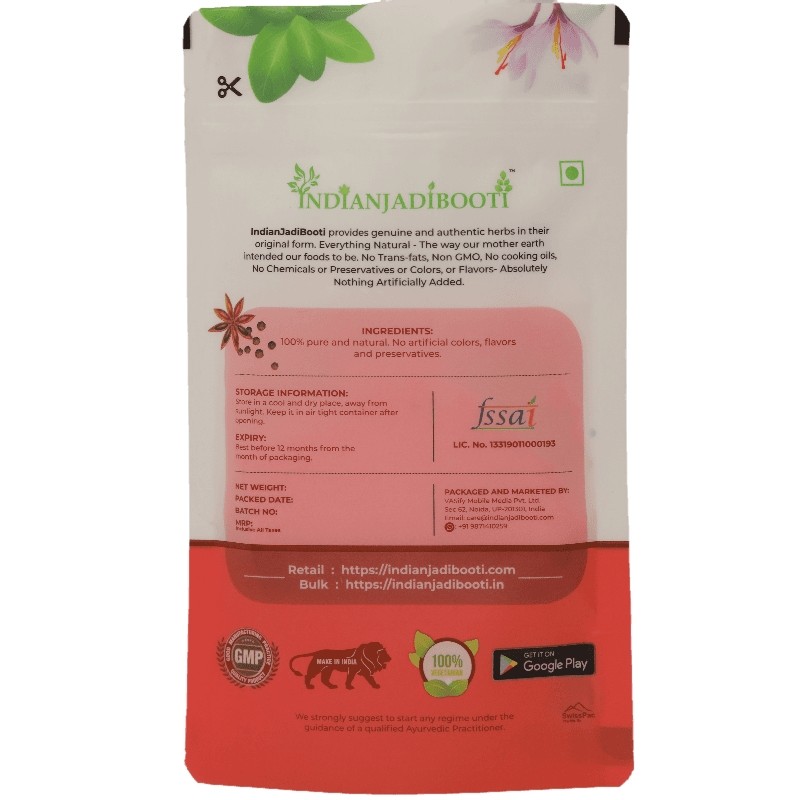













- Stock: In Stock
- SKU: HERB000309
- Shipping: Free within India upto 10KG
- Quality: Premium Herbs with No Adulteration
- Delivery: Within 3 to 7 Working Days in India
- Shipping: From Delhi based Facility
- Transport Charges for 25KG and above: Extra on To Pay
- COD Available: Max Limit: 2 Kg and Rs 3500 per order
- Discount on Prepaid Orders: Rs 50/- off. Auto Apply on Checkout.
Available Options
Description
Kateri fruit, the medicinal plant, is widely used by traditional medical practitioners for curing various diseases. Kantakari (Solanum xanthocarpum Schrad. & Wendl.) of the family Solanaceae is one of the dasamoola and commonly used drugs in Ayurveda. In traditional systems of medicine, different parts like leaves, stems, flowers, roots, the seeds of Solanum xanthocarpum, and the fruit as a whole are used. The drug is used as an antiasthmatic, hypoglycemic, anti-inflammatory, anti-tumor, anti-tussive, antipyretic, antispasmodic, antihistaminic, hypotensive, and cytotoxic agent.
Health benefits of Kantakari:
Katehli (Fal) Cures asthma:
An inflammatory chronic lung condition of the airways is asthma. The Kantakari fruit has a great number of uses for managing asthma symptoms and preserving lung health. Chemical histamine serves as a mediator for asthma in humans. The strong antihistaminic properties of Kantakari extract prevent the histamine-induced constriction of the airways. Additionally, the bronchioles are widened by the Kantakari formulation, which also lessens swelling and mucus production. Additionally, Kantakari fruit prevents respiratory allergies, the common cold, and sinusitis.
Ringni treats urinary issues:
The Kantakari fruit's inherent diuretic properties cause an increase in urine production and the removal of toxic substances from the body. By removing salt from the body, this herb lowers blood pressure. Additionally, Kantakari's antibacterial property prevents bacterial growth and treats symptoms of a urinary tract infection such as burning urination, frequent urination, excess urination, back pain, vomiting, and weakness.
Kateri (fruit) improves liver health:
By preventing the harm caused by free radicals, the hepatoprotective and antioxidant properties of Kantakari fruit prevent the oxidation of healthy cells. This medical mixture helps the liver function properly and regenerate new cells while also enhancing the liver's metabolism.
Bhatkatiya facilitates digestion:
Extract from Kantakari is effective in treating indigestion and enhancing digestion. Agnimandya (weak digestive fire), which is brought on by an aggravated Kapha dosha, is the main cause of indigestion. Consuming Kantakari fruit helps to maximize Agni (digestive fire) and makes it easier for meals to be digested. This is ascribed to Kantakari's Deepan (appetizer) and Pachan (digestive) properties.
Bruhati encourages hair growth:
Aggravated Vata dosha, which causes hair to be dry or flaky, is the primary cause of hair loss. As a result of its vata-pacifying properties, the herb Kantakari is very good at preventing hair loss and encouraging hair growth. Applying Kantakari juice to the scalp regularly prevents hair fall and strengthens hair roots.
Tips:
Take 4-6 teaspoons of Kantakari juice or as per your requirement.
Mix with an equal amount of water.
Apply evenly on the hair and scalp.
Let it sit for 2-3 hours.
Wash with shampoo and rinse well.
Use this remedy 1-2 times a week to control hair fall.
Kateri (fruit) benefits:
It helps us prevent and cure the following:
Kateri Fruit is a very useful Ayurveda herb, used widely in the treatment of cough, cold, asthma, and other respiratory tract conditions:
Kateri is used in laryngitis, hoarseness of voice, etc.
It naturally improves digestion strength and is widely used in respiratory disorders.
Kateri Fruit is sweat-causing and also helps in reducing Kapha Vata.
Kateri fruit, also known as Solanum xanthocarpum or Kantakari, has various regional names across India. Here are some of the common names:
Kantakari - Hindi
Bhatkataiya - Marathi
Nelagulla - Telugu
Kandangathiri - Tamil
Brihati - Sanskrit
Bhoy Ringani - Gujarati
Brahati - Bengali
Nayikadugu - Kannada
Vishallu - Malayalam
Nela Mulaka - Odi
Other Names: Kantkari, Huang guo qie, Yellow-berried Nightshade, Indian Solanum, Aubergine de Siam à fruits panachés, Thai-Aubergine, Bethiringani, Bhauringani, Kateli, Katai Choti, Choti Kateri, Kandiari, Bhatkatai, Nelagulla, Kiragulla, Solanum xanthocarpumSchrad, Bhauringani, Kataringani, Katai Khurd, Kandiari, Barumb, Kantakari, kantkari, Nidigadhika, Kateri,Katai, Bhat Kataiya, Kanthakari, Milk Thistle, Ringani, Kanteli, Thorny Night Shade, Wild Eggplant, Yellow Berried Nightshade, Febrifuge, Kanteri, kateri fruit Kateri Fruit , Solanum Xanthocarpum , Bhatkatiya , Kantakari, Katehli Fal, Bhatkatiya, Kantakari,Katehri Phal, Katehli, Kateli, Katahri, Kantkari katehli fal,katehri phal, Katheri, Katheli, Kanthkari, Kantakaari, Bhatkataiya kateri fruit katehli fal solan, Ringni, Bruhati, Solanum Trilobatum, Varthaki, Brihati, Bhatakataiya, Brihathi, Kantkaari, Solanum Torvum, Kandankathiri, Thoothuvalai, Thuthuvalai, Tuduvalai, Vakudu Kayalu, Putharichunda, Solanum Surattense, Turkey Berry, Bhruhati, Brahati, Khateri
Reviews
100% Customers recommend this product
-
5 Awesome85%
-
4 Great15%
-
3 Average0%
-
2 Bad0%
-
1 Poor0%
Reviews Over Kateri (Fruit) - Katehli (Fal) - Ringni - Solanum Xanthocarpum - Bhatkatiya - Kantakari - Bruhati - Katehri Phal by IndianJadiBooti
- (4.85)
Total Reviews (20)
click here write review to add review for this product.
-
(0)
-
(0)
-
(0)
-
(0)
-
(0)
Report this review.
FAQ
Kantakari is indeed employed in Ayurvedic medicine. The Ayurvedic medical system's Dashmula includes Kantakari as one of its constituents. It is included in the Indian Ayurvedic pharmacopeia.
In English, kantakari is referred to as a febrifuge herb.
To treat toothaches, apply dried fruit ash.
Kantakari extract has demonstrated benefits for decreasing blood glucose.
There is no data in Ayurvedic medicine on the side effects of the use of Kantakari. Therefore, you need to consume this medicinal herb as prescribed. You also need to use it cautiously if you have Pitta disorders. Otherwise, you may experience discomfort because of its potency.
The leaves of the Kantakari plant can be used to form a paste. To receive the advantages, apply this paste to the skin. Before taking anything, you should speak with a skin doctor if you have any skin conditions.
















